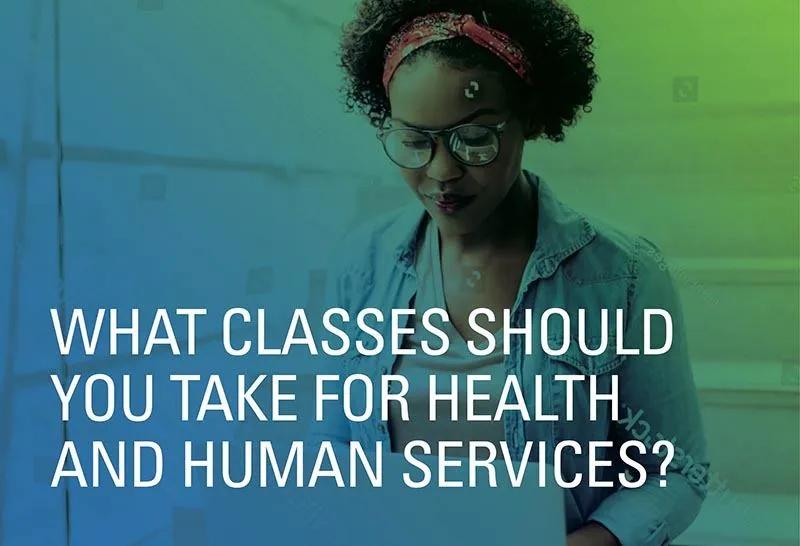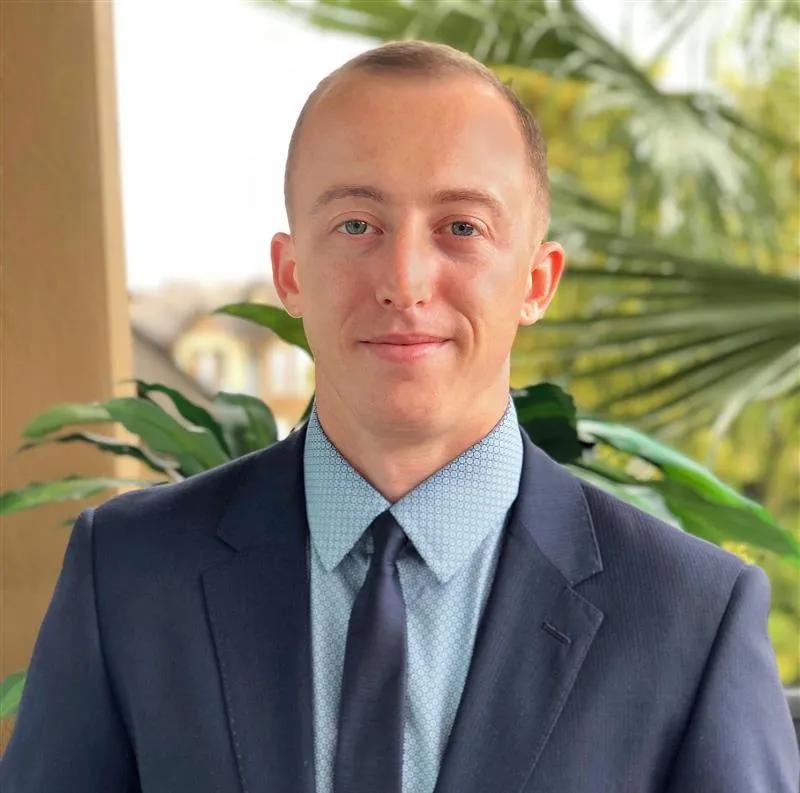What Classes are Needed for Health and Human Services?

Education and Training for a Career in Health and Human Services
Health and human services (HHS) professionals connect clients with the resources they need, whether due to a physical or mental health condition or because of the obstacles they face. Examples of the latter include having substance abuse issues or working to overcome the effects of major trauma. If you’re new to this field, several social service classes can help prepare you to serve clients with all types of needs, as well as to promote public health. They do this by building foundational knowledge in health and human services and by helping to strengthen the skills that can improve your success in these roles.
Skills Needed for a Career in Health and Human Services
Health and human services professionals typically work with clients who have specific issues or needs. For instance, some HHS workers spend their days trying to help families in need locate and secure affordable housing. Others work with clients who have co-occurring mental health and substance abuse issues, assisting them with finding programs designed to address and resolve both concerns at the same time.
Building certain skills can help make it easier to perform the functions often required in health and human services roles. The skills that are beneficial for workers in this field include:1
- Communication skills. When speaking with clients, having good listening skills enables you to better understand their concerns and identify their specific needs. It’s equally as important to be able to accurately and effectively communicate these concerns and needs to the programs available to the client. Choosing a human services program that teaches you how to enhance your communication skills can make you more successful in your role.
- Interpersonal skills. As a health and human services worker, you may be working with clients who have sensitive or very personal needs. The ability to get clients to open up about what these needs are or the issues they face helps you get a clearer picture of the programs that may assist them. This is where interpersonal skills come into play. These skills can help make a client feel more comfortable when speaking with you. Compassion and empathy are two qualities that are related to interpersonal skills and can enhance the human services worker-client relationship.
- Problem-solving skills. Many health and human services roles involve not only working to identify the issues that may be preventing clients from living their best life but also in finding ways to solve these issues. Professionals with good problem-solving skills are able to identify the solutions that exist, then narrow down these solutions to find the ones that have the best chances of successfully resolving the client’s most problematic issues.
- Organizational skills. Part of a health and human services worker’s role is case management, which involves planning, seeking, advocating for, and monitoring services on behalf of your clients.2 When you are serving clients, it’s important to keep their case files and paperwork organized so you can easily find the information you need. Having good organizational skills also makes it easier to recognize whether any additional paperwork may need to be completed to get your clients the services that can help them most.
- Time management skills. It’s not uncommon for social service workers to have high caseloads.3 To help all your clients requires managing your time in a way that allows you to spend quality time on each of their cases. Knowing certain time management techniques provides this ability. Having strong time management skills may even help you avoid feelings of burnout.4
Health and Human Services Education and Training
Completing a human services program can help prepare you for entry-level health and human services positions. Some employers may also require that you complete an HHS educational or career training program before you can apply for a specific position within that organization.
Even if a specific level of education or career training program is not required, these courses can help provide the knowledge and skills needed to perform health and human services functions. They may also allow you to stand out from other job applicants who don’t have this type of foundational knowledge or skillset.
Classes to Take for a Career in Health and Human Services
Because health and human services is such a broad field, the classes in this type of degree program often cover several topic areas. These include professional skills, health and human services field courses, healthcare-related courses, and general education classes.
Professional Skills
As mentioned, human services professionals can benefit from building skills related to the performance of their job functions. These are skills that, when developed, help contribute to their success in this field, both in the learning and professional environments.
At Ultimate Medical Academy (UMA), our Health and Human Services associate degree program includes a few different professional skills-based classes designed to prepare students for entry-level health and human services positions by promoting skills important in this field. They include:
- Computer Fundamentals. This course provides an overview including an investigation of hardware, software, Microsoft Windows, operating systems, and essential applications. Students in this course explore working online, and the impact of computing and the Internet on society. Special attention is given to information technology and communication for the allied health profession.
- Interpersonal Professional Communications. Students are introduced to written and verbal communication strategies that help enhance their ability to be successful in the allied healthcare field. Topics in this course include steps for developing business documents, presentation materials, and meeting management skills.
- Career Success. In this course, students have an opportunity to revisit their personal and professional goals as they prepare for interviews and the job search in the allied healthcare field. Through the exploration of job search skills, resume writing, interview preparation, group dynamics, and workplace behaviors, students apply essential understandings to a career in the healthcare field.
- Student Success. The purpose of this course is to introduce students to both skills and resources that will help them be successful in their UMA courses and program. Students learn about specific resources and strategies to help them maximize their learning, as well as increase self-motivation and self-awareness.
Health and Human Services Field Courses
Health and human services is all about identifying clients’ issues and finding ways to solve those issues and/or meet your clients’ needs. As such, it can be helpful to understand how these needs may have arisen, whether on an individual, family, community, or societal level.
A health and human services degree program can include classes that provide this knowledge. For instance, UMA courses that address these topics include:
- Public and Community Health
- Social Welfare
- Family Dynamics
- Human Behavior in the Social Environment
A health and human services program also educates students about what it means to work in a health and human services role, highlighting some of the issues you may face if you decide to pursue a career in the HHS field. Courses that you may find in a health and human services degree program that cover these topics include:
- Introduction to Health and Human Services
- Legal and Ethical Issues in Human Services
- Introduction to Counseling
- Healthcare-Related Courses
HHS workers interested in working within a healthcare facility or who want to help clients with physical or mental health needs can benefit from increasing their knowledge of the healthcare system and human health, in general.
Knowledge of the healthcare system can help prepare clients as to what to expect when in these types of programs. Knowledge of human health can give you an idea of what types of issues a client may face based on their physical or mental health conditions. This information can then be used to direct the client to the programs best suited to help overcome or resolve those issues.
Health and human services courses with a healthcare foundation include:
- Introduction to U.S. Healthcare
- Medical Terminology
- Human Growth and Development
- Anatomy, Physiology, and Pathophysiology
General Education
If a health and human services degree program includes classes specific to this field, why look for one that also offers general education coursework? Because the goal of general education classes in higher education is “to assure intellectual breadth as opposed to the depth of expertise created by the student’s major.”5
Put another way, while classes specific to your field help you hone your expertise in this area, general education classes help increase your knowledge in other areas, providing a broader and more well-rounded knowledge base.
General education classes that may be found in a health and human services degree program include:
- English Composition
- College Math
- General Biology
- Sociology
- Psychology
- Critical Thinking and Problem Solving
Get Your Health and Human Services Degree
If you’re interested in pursuing your human services degree, UMA is here to help. We offer a Health and Human Services associate degree online program that includes courses in all four of these areas: professional skills, health and human services field courses, healthcare-related courses, and general education coursework.
This program can help prepare you for an entry-level health and human services role in 18 months.6 Since it is offered online, it enables you to obtain a human services degree without having to commute to and from campus. This offers flexibility in study time enabling you to tend to your work and family obligations with minimum disruption.
UMA’s Health and Human Services associate degree online program can also prepare you to further your studies in this field, whether your goal is to get your bachelor’s degree, master’s, or doctoral degree.7
Contact us today to learn more about this degree program or, if you’re ready, to enroll!
1 Bureau of Labor Statistics. Occupational Outlook Handbook. Social and Human Service Assistants. How to Become a Social and Human Service Assistant. https://www.bls.gov/ooh/community-and-social-service/social-and-human-service-assistants.htm#tab-4
2 NASW. NASW Standards for Social Work Case Management. https://www.socialworkers.org/LinkClick.aspx?fileticket=acrzqmEfhlo%3D&portalid=0
3 Social Work Policy Institute. High Caseloads: How Do They Impact Delivery of Health and Human Services? https://www.socialworkers.org/LinkClick.aspx?fileticket=j4EjpqymytY%3D&portalid=0
4 Entrepreneur. How Time Management Can Help You Avoid Burnout. https://www.entrepreneur.com/article/345091
5 Missouri General Assembly Joint Committee on Education. General Education Requirements: A Look at the Structure of Higher Education.” http://www.senate.mo.gov/jced/GeneralEducationRequirementsRethinkingtheStructureofHigherEducation.pdf
6 Completion time varies depending on individual student.
7 Select credits may transfer at the discretion of the receiving institution.
Request Information
Talk with us. Start your journey.
Complete this form and we'll call you to explore options at UMA and answer your questions. We'll also email you info on how to get started. We're with you at every step!
Request Information
Talk with us. Start your journey.
Complete this form and we'll call you to explore options at UMA and answer your questions. We'll also email you info on how to get started. We're with you at every step!
About the Author
 Adam Fenster
Adam FensterAdam Fenster is a senior copywriter at Ultimate Medical Academy, with journalism experience from his time as a reporter and editor for multiple online and print publications. Adam has been covering healthcare education since 2019, with an emphasis on topics such as wellness, healthcare employment, and job preparedness. He received his BA in journalism from the University of South Florida.
Related Content


